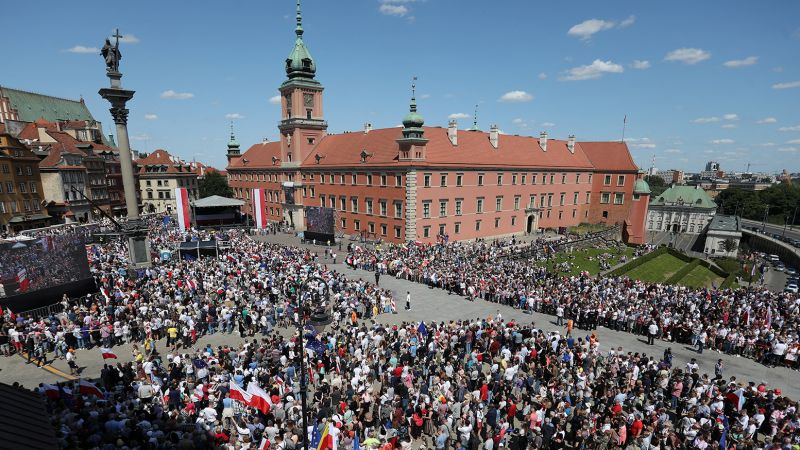CNN
—
When US President Joe Biden visited Poland in February, his second visit in less than a year, it was something of a vindication for the Polish government. A clear sign that Poland was still a key ally – despite accusations that its government is undermining democracy and the rule of law.
As a large NATO member on the eastern flank of the alliance, Poland has always been a crucial partner for the US and its Western allies, but its importance rose to a new high after Russia launched its full-scale invasion of Ukraine in 2022.
Warsaw has become indispensable.
“Poland has been one of Ukraine’s strongest allies internationally, it’s been the main hub for supplying arms to Ukraine, but it’s also receiving refugees coming from Ukraine,” Aleks Szczerbiak, a professor and the head of the politics department at University of Sussex, told CNN.
“The United States, the Biden administration, which has been very critical of the Law and Justice government, has basically decided that Poland is the linchpin to regional security and therefore it has kind of shifted, it has put its ideological concerns on the back burner, and it’s shifted to a very close working relationship with Poland,” he added.
This new-found importance puts Poland’s European allies into a tricky position: While they need Poland’s full commitment and support, they also need to confront the fact that its government continues to push ahead with what many in the EU see as attacks on judicial independence, press freedom, democratic principles and the rights of women and minorities.
“The problems that were there a year ago have not evaporated. Of course, the broader geopolitical situation has changed and Poland act as an important partner, but its internal problems with the justice system remain the same,” said Agnieszka Kubal, an associate professor at the School of Slavonic and East European Studies at University College London.
“To me, the worst case scenario would be that Poland would get away with democratic backsliding because it hosts Ukrainian refugees,” she added.
Poland is holding parliamentary elections this fall, a race that is shaping up to be very tight.
Law and Justice has so far struggled to take a decisive lead over the opposition Civic Platform grouping. The party has been in power since 2014, having won reelection in 2019. A third consecutive term would be unprecedented in Polish post-Communist history.
The punches from the abroad keep coming. On Monday, European Union’s top court ruled that Poland’s judicial reforms were in breach of the bloc’s laws and ordered it to make changes or face steep fines.
Then on Wednesday, the European Commission announced it was suing Poland over a new law that sets up a special commission tasked with investigating Russian influence in Polish politics. The Commission said the law violates the principle of democracy and could be used to silence opposition. The US has also criticized the law, with the US State Department saying it “could be used to block the candidacy of opposition politicians without due process.”
The central question the investigative body will focus on is whether the previous government allowed Poland to become too dependent on Russian gas. Law and Justice has justified the law by saying the dependence on Russian gas has hurt Poland’s interests. Critics, however, see it as the government’s attempt to oust its biggest political opponent, Donald Tusk.
Tusk, who is the leader of the Civic Platform party, served as Poland’s prime minister between 2007 and 2014. During that time, he signed an agreement with Russia’s Gazprom, along with Germany and other countries.
As it was passed, the law envisions the investigative commission to be composed of predominantly pro-government lawmakers, who would have wide-ranging powers, including the ability to effectively ban people from holding a public office for 10 years.
After fierce criticism, President Andrzej Duda said the law would be amended and reviewed by the country’s Constitutional Court, but that could take months.
“To accuse somebody in Poland of being under Russian influence is a political death sentence. It was in the past, but especially now that Russia is waging a invasion against Ukraine,” Kubal told CNN. “I can imagine the commission’s work being on front pages in the next six months. Of course, it will be a huge influence on the campaign,” she added.
The new law was one of the reasons behind anti-government protests in Warsaw last Sunday, on the 34th anniversary of Poland’s first postwar democratic election. Hundreds of thousands of people took to the streets protesting against the new law, the widely criticized judicial reform, the government’s homophobic and anti-abortion policies and its near constant clashes with the EU.
The massive demonstration was led by Tusk himself and billed as a test of the opposition’s ability to defeat Law and Justice.
Szczerbiak said it might be a sign of things to come. “This election is not going to be determined by people shifting from one side to another. The key is to mobilize your own side and the kind of messages that you send in order to get your own side [mobilized] are different from if you’re trying to win over center ground voters,” he said.
“I think that it will be a very bare knuckle fight … if you feel that democracy is at stake, you’re more likely to turn up [than] if you think the world’s not going to end if you don’t vote.”

